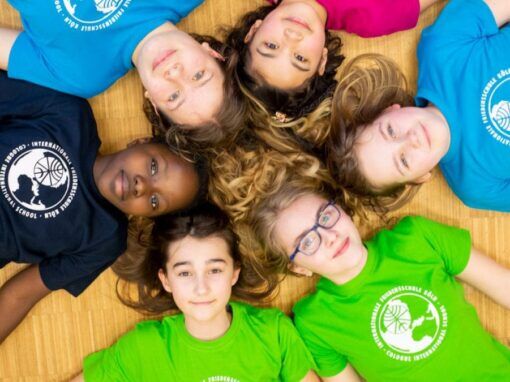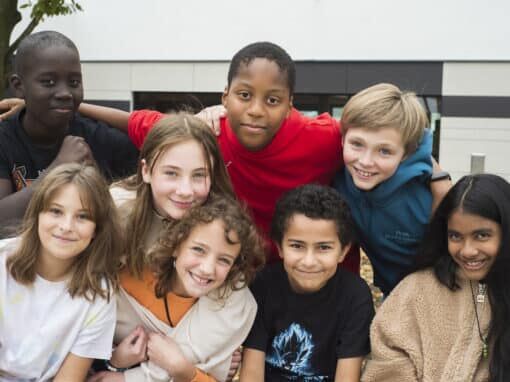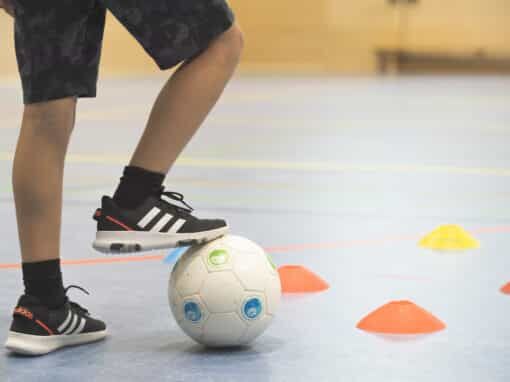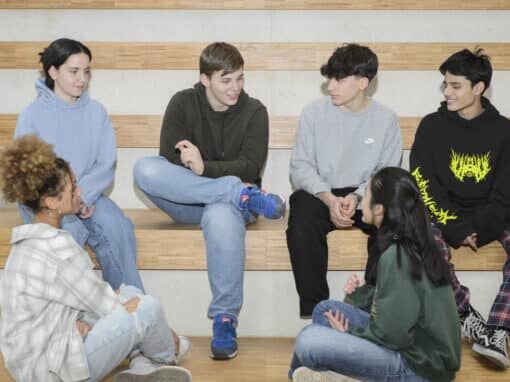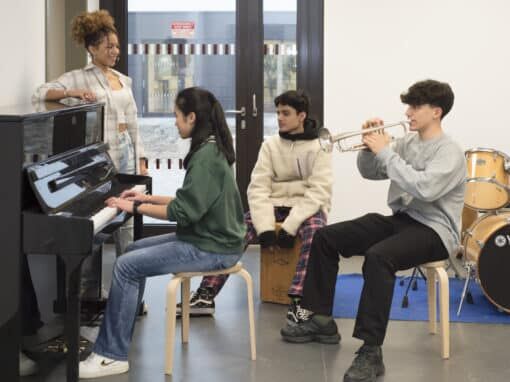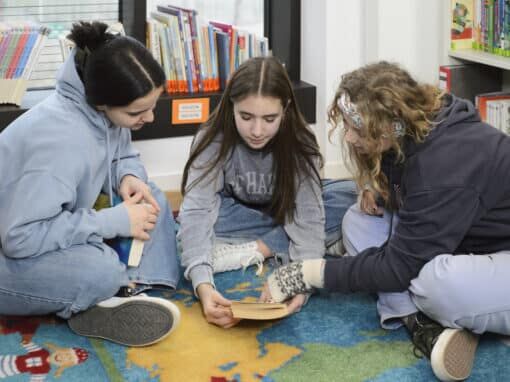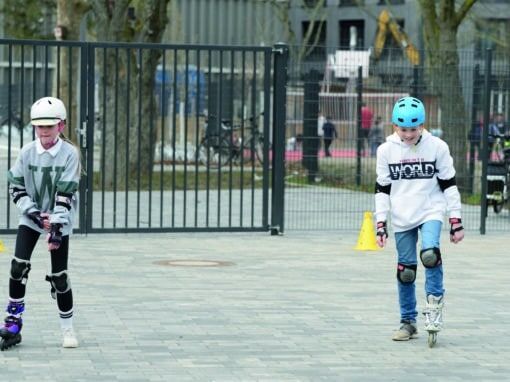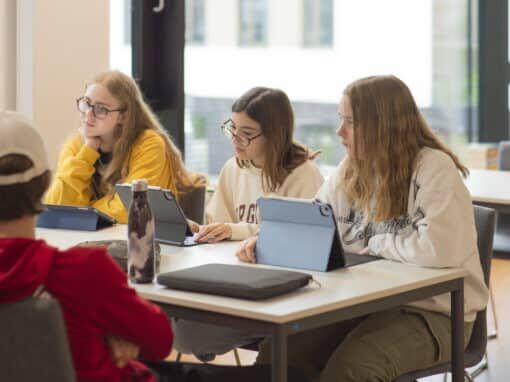A new school model for secondary education at Cologne International School
Individualized
Cologne International School is committed to providing our students with an individualized learning experience through a rigorous pursuit of excellence in learning in a culture of continuous improvement.
Live life, love learning
As an IB World School, we are dedicated to promoting international-mindedness and a love of learning in a multicultural setting:
International SECONDARY SCHOOL
IB Diploma Programme
Allgemeine HochschulreifeEnglish
IB MIDDLE YEARS PROGRAMME
Hauptschulabschluss/Mittlerer SchulabschlussEnglish
Grades 6-10
To explore and fulfill the potential within ourselves
- focus on skills that show students how they learn and make them independent learners
- emphasis on developing good learning behaviour
- coaching to support goal setting and reflection
- pastoral and learning support; counselling
- emphasis on positive student – teacher relationships
To connect with each other and our world
- International mindset created by an international community
- Innovative program with a holistic approach from grades 1 – 12
- cloud-based learning platform
- trips and exchanges
To make a positive impact on tomorrow
- social projects
- work experience
- an environment dedicated to the values of the IB Learner Profile:
- reflective
- caring
- open minded
- risk-takers
- principled
- thinkers
- knowledgeable
- balanced
- inquirers
- communicators
If you would like to find out more about our new model, please contact our admissions office.
International Secondary School
Grades 6-10
IB Middle Years Programme (IB MYP)Grades 6-10
GRADES 6-10
IB MYP
The MYP aims to develop active learners and internationally minded young people who can empathize with others and pursue lives of purpose and meaning.
The programme empowers students to inquire into a wide range of issues and ideas of significance locally, nationally and globally. The result is young people who are creative, critical and reflective thinkers.
Grades 11-12
IB Diploma Programme (IB DP)Grades 11-12
THE IB DIPLOMA PROGRAMME
We value the broad range of subjects offered in the International Baccalaureate Diploma Programme (IBDP) and believe that this programme provides young people with the knowledge, competencies and understanding required at university and beyond. Most of all, we are committed to developing the values promoted in the IB Learner Profile.
The IBDP consists of three core components and six subject groups
THE DIPLOMA CORE
- Theory of Knowledge ensures that IB learners are thinking critically in all of their subjects
- Creativity, Activity, Service (CAS) helps students maintain a balance between academic study and their extracurricular lives
- The Extended Essay enables students to develop the research skills required of university students
THE SIX OPTION BLOCKS
Students choose one subject from each block.
Block 1 – English
- English A: Language & Literature (Higher Level or Standard Level) – for students with a native speakers’ level
- English B (HL) – a foreign language course (CEFR level B2)
- Self-Taught, School-Supported Language A: Literature (SL) – the student’s mother tongue
Block 2 – Additional Language
- German A: Language and Literature (HL or SL) – for students with a native speakers’ level
- German B (HL or SL) – a foreign language course (CEFR levels B1 – B2)
- German ab initio (SL) – a beginners’ German course (leading to CEFR level A2)
- Spanish B (HL or SL) – a foreign language course (CEFR levels B1 – B2)
- French B (HL or SL) – a foreign language course (CEFR levels B1 – B2)
Block 3 – Individuals and Societies
- History (HL or SL)
- Geography (HL or SL)
- Business Management (HL or SL)
Block 4 – Sciences
- Biology (HL or SL)
- Physics (HL or SL)
- Environmental Systems and Societies (SL only) – a transdisciplinary science/humanities course
- Sports, Exercise & Health Science
Block 5 – Mathematics
- Mathematics: Applications and Interpretation (HL or SL)
- Mathematics: Analysis and Approaches (HL or SL)
Block 6 – Arts and Electives
- Visual Arts (HL or SL)
- Psychology (HL or SL)
- Chemistry (HL or SL)
- Music (HL or SL)
- Computer Science
Individualized Learning
Throughout our school we utilize a range of learning and teaching styles – individual coaching, technology-integrated learning, group projects and independent study – to suit all types of learners. Because learning is a partnership, we provide families with frequent feedback points throughout the year, as well as conference time between teacher, student and parent.
Empowering Education
Coaching, counseling and career guidance in the upper years of the secondary school further support students as they make important decisions about their future ambitions. The positive feedback we receive from alumni about their university and professional lives confirms that we’re on the right path.
Values and Responsibilities
Throughout our secondary school, we focus on fostering shared values, such as communication, open-mindedness, reflection, and thoughtfulness. Our objective is to instill in our students a sense of responsibility to our community and to the greater world around them. While no one knows exactly what the future will bring, we can be confident that our students and alumni, as caring and mature global citizens, will be working hard to shape and brighten our common future.
Holistic Approach
Our student council teaches the valuable, practical components of living in a democracy, giving students a voice in the school and an opportunity to bring about change. Additionally, our school counselor and Personal Social Health Education workshops help our youth and young adults navigate the new and complex challenges that often accompany this stage of their lives.
Mittlere Reife (Schulabschluss)
CIS students may choose to have their eAssessment results recognized as an equivalent to the Mittlere Reife in Germany. In order to convert these to the Mittlere Reife, CIS students must present their results to school authorities in Cologne.
Bezirksregierung Köln – Zeugnisanerkennungsstelle
Zeughausstraße 2-10
50606 Köln
Tel.: 0221 147 2467
All requirements to fulfil the criteria for the Mittlere Reife are met in the compulsory CIS programme. HERE you can find the definitive version in German.
| Year | Number of Diploma Candidates | Average Diploma Score | Highest Diploma Score |
|---|---|---|---|
| 2019 | 17 | 30 | 39 |
| 2020 | 27 | 34 | 40 |
| 2021 | 20 | 33 | 42 |
| 2022 | 20 | 34 | 41 |
| 2023 | 23 | 30 | 39 |
| 2024 | 39 | 32,3 | 43 |
| 2025 | 37 | 33 | 44 |
See what a day at the secondary school looks like
Example Timetable: Grade 8
Study skills (target setting, approaches to learning & planning); number skills; health
Geography & History
EAL - English as an Additional Language
EAL - English as an Additional Language
Geography & History
Philosophy & World Religion; personal, social, health education; IB Learner Profile
- Targeted LearningStudy skills (target setting, approaches to learning & planning); number skills; health08:15 - 09:45
- Morning snack & Break09:45 - 10:15
- HumanitiesGeography & History10:15 - 11:45
- Math11:45 - 13:15
- Lunch & Break13:15 - 14:00
- Spanish / French / EALEAL - English as an Additional Language14:00 - 14:45
- German / GALGAL - German as an Additional Language14:45 - 15:30
- Clubs15:30 - 17:00
- HumanitiesGeography & History08:15 - 09:45
- Morning snack & Break09:45 - 10:15
- Personal GrowthPhilosophy & World Religion; personal, social, health education; IB Learner Profile10:15 - 11:45
- German / GALGAL - German as an Additional Language11:45 - 13:15
- Lunch & Break13:15 - 14:00
- Math14:00 - 14:45
- Clubs14:45 - 17:00
School Semester Calendar
Extracurricular Program at our Secondary School
Our extracurricular program offers a wide range of stimulating, challenging and fun activities for all of our students, from sports and music, to academic support and study time. We also strive to keep our gifted students challenged, by providing them with additional learning opportunities, such as debating competitions and the Maths Olympiad.
15:30 – 17:00
Monday, Wednesday and Thursday
14:45 – 16:15
Tuesday and Friday
MUSIC
- Learning about music in everyday life and pop culture
From electronic to rock to usage in advertisements and computer games - Student-led projects and compositions
A core element of our music curriculum is giving youth the framework to create and use music that’s interesting to them, from rap and musicals to advertisements and short films - Giving students a voice
Through developing their vocal and instrumental skills, we help students use their creativity in a targeted manner to realize their ideas
SPORT
- State-of-the-art sports hall
Fully-equipped - Four hours of physical education per week
More than the state requirements for each year - Wide range of sports activities
Attractive team and individual sports in our extracurricular afternoon program
ART
- Student exhibitions
Student exhibitions pay tribute to the success of all our aspiring artists throughout their school career - Museum visits
We visit museums and exhibitions to experience art as a universal form of human expression - Aesthetic judgment
With increasing artistic experience, our students learn to critically assess a wide variety of works and art forms
Experience a day at our secondary school
We are happy to invite any prospective student to a trial day, when they can visit lessons and meet some of our teachers and students. The trial day, which ends with a personal meeting with School Leadership, allows your child to get a real feeling for our school community.
Career and University Counsellors
Enhui Shi enhui.shi@if-koeln.de
University Destinations
Canada
University of Guelph (Real Estate Management)
Germany
Duales Studium (Bayer)
Hasso Plattner Institute
Technische Universität München
RWTH Aachen University (Business Administration and Engineering, Computer Science)
University of Cologne (Business Administration, Fine Arts, Medicine, Spanish)
Finland
University of Oulu (International Teacher Training)
Hungary
International Business School, Budapest (Hotel Management)
Netherlands
Maastricht University (Business Engineering)
Tilburg University (International Sociology)
TU Delft (Aerospace Engineering)
University of Groningen (Psychology)
Leiden University (Security Studies)
Eindhoven University of Technology
Spain
University of Alicante
IE University in Madrid
IE University in Segovia
UK
King’s College London (History, Liberal Arts)
Richmond University (International Relations)
School of Oriental and African Studies, University of London
University College London (Biomedical Science)
University of East Anglia (Creative Writing)
University of Greenwich (Psychology)
University of London (International Relations)
University of Northampton (Business Psychology)
University of Southampton (International Relations)
University of West London (Creative Writing, TV Production)
University of Westminster (Architecture)
USA
Michigan State (Engineering, Liberal Arts)
New York University (Biology)
Toledo University, Ohio (Biomedical Science with a scholarship)
University of Colorado Boulder
